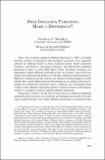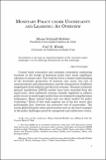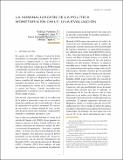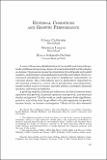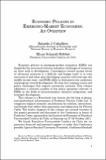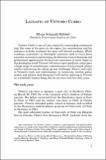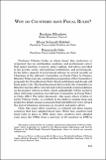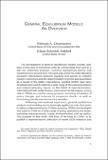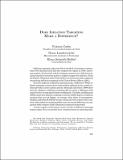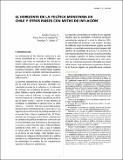Buscar
Mostrando ítems 1-10 de 24
Does inflation targeting make a difference?
Since New Zealand adopted inflation targeting in 1990, a steadily growing number of industrial and emerging economies have explicitly adopted an inflation target as their nominal anchor. Eight industrial countries and thirteen emerging economies had full-fledged inflation targeting in place in early ...
Monetary policy under uncertainty and learning: an overview
Central bank economists and academic economists conducting research on the design of monetary policy have made significant advances in recent years. This work has led to a clearer understanding of the desirable properties of interest rate rules, the role of announcements and communication, and the ...
La nominalización de la política monetaria en Chile: una evaluación
En agosto del 2001, el Banco Central de Chile 'nominalizó' su principal instrumento de política monetaria, reemplazando la tasa de política monetaria (TPM) indizada a la Unidad de Fomento, que usaba hasta la fecha, por una TPM nominal o denominada en pesos. Una serie de consecuencias, tanto en la ...
External conditions and growth performance
A central dimension of globalization is the world trend toward larger trade and financial openness, observed in most industrial and developing economies. Openness increases the integration of world goods and capital markets, contributing to potential gains in growth and welfare. However, increased ...
Economic policies in emerging-market economies: an overview
Economic policies in emerging-market economies (EMEs) are shaped by the structural features and policy challenges of countries on their road to development. Convergence toward income levels of advanced countries is a difficult and bumpy road—it is even uncertain if and when most developing countries ...
Laudatio of Vittorio Corbo
Vittorio Corbo is one of Latin America’s outstanding economists and like some of his peers in the region his contributions and his influence includes academia but goes well beyond academia. While academic economists in developed countries tend to focus more narrowly on research and teaching the diversity ...
Why do countries have fiscal rules?
Professor Vittorio Corbo in whose honor this conference is organized has an outstanding academic and professional career that spans teaching research policy making and advice provided to the private sector international institutions and governments. In the latter capacity of government advisor he ...
General equilibrium models: an overview
The development of general equilibrium models (GEMs) goes back a long way in economics, both at a theoretical level and as a tool for empirical analysis. General equilibrium theory and modeling have proved to be relevant and useful for understanding economic interactions between markets and agents in ...
Does inflation targeting make a difference?
Inflation targeting is the new kid on the block of monetary regimes. Since New Zealand and Chile first adopted the regime in 1990, a growing number of industrial and developing countries have followed suit, anchoring their monetary policy to explicit targets for inflation.
El horizonte de la política monetaria en Chile y otros países con metas de inflación
La tolerancia a cierta volatilidad en la tasa de inflación lleva a que aquellos países que tienen metas de inflación diseñen su política monetaria de modo que refleje flexibilidad en cuatro dimensiones: el índice de precios para el cual se define la meta, el ancho del rango meta, el punto medio del ...

